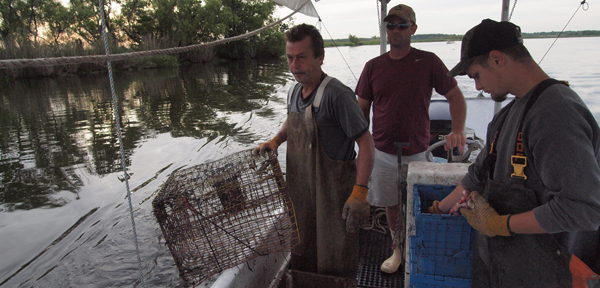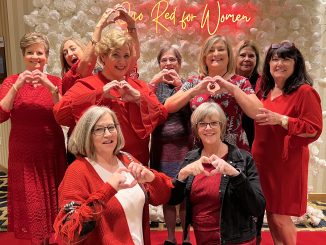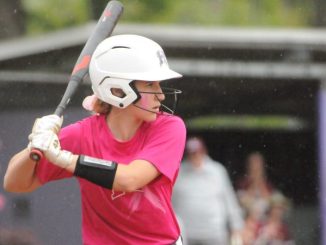
In the still darkness of the morning, three crabbers in a pickup truck arrived at Lac Des Allemands before dawn.
As the sun peeked out from the horizon casting its rays over the lake, the crabbers unloaded tubs full of catfish heads from Matthew Fonseca’s truck into his boat.
Fonseca has been doing this twice a week for every crab season for half of his life.
This year he has been hitting the lake for two months with little to show. The 34-year-old has had the worst luck he has ever experienced. Due to a cold front that brought along torrential rains, it has been six days since Fonseca last ran his traps. In a normal year, those traps would have been filled with crabs.
This is not a normal year.
The last time the three ran the traps they barely had enough crabs to pay for gas for Fonseca’s boat.
“I think we had 60 pounds out of 400 cages. We usually would have 1,000 to 1,500 pounds,” Fonseca said.
That is the difference between a payday of just over $150 and one closer to $2,000.
As a slowly churning outboard motor propels the boat over the water, Fonseca’s cousin, 54-year-old “Papa” Joe Frieze, spots the buoys as they appear along the surface of the water in the front of the boat.
Fonseca lowered a scoop via a rope and pulley system to snag the line and Frieze pulled aboard a trap containing only two small crabs.
Frieze has been crabbing since he was 11 years old.
“I can’t recall a worse season. Mother Nature fluctuates, but I’ve never seen it like this,” Frieze said.
Fonseca calls out instructions to Frieze and 18-year-old Cody “Spiderman” Madere as the three work together to run a line.
“Dip!”
Frieze pulled the crab trap by a rope attached to a buoy and immediately dipped it back into the water to rinse silt and vegetation away.
“Dump!”
Frieze dumped the few crabs into a bucket for Madere, who has only been on the job for two months, to sort into different sizes and kinds – a process they call grading.
“Bait!”
Madere threw a catfish head into the container in the top of the trap.
Frieze jumped in to help Madere sort the crabs. He pointed out a “buster” – a soon to be soft shell crab that is shedding its hard outer shell.
“Red hot! That one’s on fire!” he said.
He held up one of the crab’s legs
“You see that line that looks like somebody took a red pencil across it? That means he’s about ready to back out of his shell,” he said. “Then he’ll grow to twice as big as he is now.”
The soft shell crabs bring a higher price than the hard shell variety, but with the shortage of all crabs this season the price is high for both. That is if you can catch them.
And this day, just as the last time Fonseca, Frieze and Madere went out, trap after trap yields nothing at all or only a few small-to-medium-sized crabs. Occasionally, just occasionally, the trio find a good-sized crab.
By the time they have run 200 traps the trio has only filled half of a flat, or picked up about 30 pounds, of saleable crabs.
“I usually call in a truck from Alabama, but I haven’t caught enough for them to drive all the way out here,” Fonseca said.
With three generations of crabbers in the boat, it is easy to see the tradition of crabbing going back for decades for families living along Lac Des Allemands.
Both Frieze and Fonseca learned how to crab from Fonseca’s grandfather Raymond Fonseca, whose own career as a crabber pre-dated the outboard motor.
“They used to have a skiff and everybody along the bayou would attach their pirogue in a line to the back of it. It would pull them along and they would pull the crabs in,” Fonseca said.
Now only a few crabbers can be found on Lac Des Allemands. Frieze points out another cousin who is running his own set of traps.
“As you can see, us and our family members are the only ones out here. We are the last of a dying breed,” Frieze said.
But there is hope. Of the five children Fonseca is helping raise, his 13-year-old son enjoys going out with them.
“He loves it,” Fonseca said. “He can’t get enough of it.”
In addition to dealing with a small crab yield, Fonseca has to also combat high gas prices and the occasional bandit running his lines and stealing his crabs.
He said he could drop his traps at another favorite location, but it is further away and he does not want to take the chance of burning up time and fuel to drive further out into the gulf.
“If we go out on the road it will cost $150 for the boat and another $50 in gas for the truck. Plus an hour on the road and an hour in the boat to get out there,” Fonseca said.
If it were not for the three of them catching their own bait, they may do better staying at home.
“We catch the catfish in hoop nets and then use their heads as bait,” Fonseca said. “You have to be resourceful out here. If I had to buy my own bait I don’t think we’d make it.”
So Fonseca continues to run the traps in Lac Des Allemands hoping that soon a warm current will flow up from the south and prompt the crabs to get back to normal behavior.
“I’d like to throw these guys a $100 bill at the end of the day, but I can’t do it if I don’t catch anything,” Fonseca said.
For people who derive 70 percent of their annual income from crabbing, Fonseca and his crew are not the only ones suffering from the bad season.
“We are paying more than we charge for them”
Further east, on Highway 90 in Boutte, Blandon Zeringue has been operating Zeringue’s Seafood for the past 15 years, a business that has been in his family for three generations.
Zeringue’s buys crabs and other seafood from local and regional fisherman.
“We deal with all of the local areas around here from Venice, to Lac Des Allemands to Lake Pontchartrain,” he said.
He and his customers have noticed the poor crabbing this year.
“It has been a very slow season going through the winter and everything with the cooler weather. It really hasn’t heated up like it usually does,” he said.
With record low temperatures in the past few weeks, crabs have been in a state of semi-hibernation and are burning up fat reserves, which means that even the crabs that are caught weigh less than usual.
“The few crabs that are coming in aren’t as full as they usually are,” Zeringue said. “They aren’t packed with meat and fat like they are sometimes.”
Zeringue said it is the same story with all of his crabbers, whether from Lac Des Allemands or otherwise.
“No one is getting rich crabbing. I mean there are some diehard ones, but they are putting out more traps than they usually do,” he said.
For Zeringue’s, this means they cannot guarantee they will have crabs available for their local customers, much less for shipments to other parts of the country such as the northeast where many Louisiana crabs end up.
The scarcity of crabs is also a bad thing for Zeringue’s bottom line.
“The price has gone up extremely from what we are normally paying at this time of the year. You are usually paying $2 to $2.50 a pound. Now they are $3 a pound,” he said. “The price you are having to sell them for, it doesn’t leave us any profit margin. We are paying more than we charge for them.”
Restaurant industry sees fallout from bad season
The Seafood Pot across the river on River Road in Norco is also experiencing the fallout from the bad crab season. The seafood restaurant has been open for eight years and owner Jan DeJean said one thing she does not like to do is disappoint her customers. However, that has been happening lately.
“There were times, like two weeks ago, when we couldn’t get crabs at all,” DeJean said. “We had disappointed customers who came in and wanted crabs and we didn’t have any.”
During the Catholic Lent holiday, where many locals forego red meat and instead eat seafood, DeJean said the lack of crabs was very much felt.
“Lent was my busiest time and of course we couldn’t get any crabs,” she said. “I can really say that it has hurt our sales because they are not catching that many crabs.”
DeJean said she hopes that the crabbing season will pick up, but she is lucky to be able to serve other seafood.
“It happens seldom. Sometimes you just have bad crab years. The fisherman don’t catch is all,” she said.
Cold spring wreaks havoc on crab crop
Billy Broussard is the vice-chairman of the state Wildlife and Fisheries Committee, and also a professional crabber.
“Our season is not doing well. It’s really lackluster at this point and it has driven the prices up really high when the demand is at its high point as well,” he said.
Broussard said much of the problem is due to cold weather the area has experienced as of late.
“I think it has much to do with this unseasonable cold spring we’ve had,” he said. “We had the lowest high on a recent Friday than we have ever had for the month of May. This is the status quo for February, but April and March have been the same way.”
In addition, Broussard said late snows in the Midwest have lowered the temperature of the Mississippi River and have contributed to higher river levels that have emptied out into the local bayous, especially near at the Davis Pond Diversion near Willowdale in Luling.
“The Mississippi water will go through the Atchafalaya Basin. With all of the snow melt that is running south right now, especially with the female crabs, they don’t like that cold water,” he said.
Despite the slow start to the season, Broussard is hopeful that the cycle will correct itself later in the season.
“We’ve seen that in the past if you have a couple of slow months on the front end, on the back end you won’t be able to pull them out of the water fast enough,” he said.
For him, it is more about the fishing itself that keeps him running his traps five or six days a week.
“As long as we can fish every day and we are coming out in the black we are going to fish,” Broussard said.
Crabbers continue to search for elusive big crabs
Much like Broussard does, Fonseca, Frieze and Madere continue to go out in search of the big crabs, even though they have not been seeing them lately, solely because they enjoy doing it even when it does not pay much.
Fonseca left the crabbing business for a few years, but he said not being independent was a real problem for him.
“I did a couple of other things. I did iron work for two years,” he said. “I enjoyed it, but what got me was in two years I almost got killed three times. Out here my life is in my hands. If I see a storm coming I can go back to the shore and I don’t have to deal with it.”
Frieze is a registered nurse and worked in a hospital for six years. He said he returned to crabbing because he just enjoys the lifestyle better.
“What happens is one day you get up and you don’t want to go to work anymore. That’s when you know it is time to quit,” he said. “It doesn’t matter how much money you make, you have to be happy with what you do.”
For Madere, although this crabbing season is his first, he continues in the footsteps of his mother.
“His mother used to come out here and work with us,” Fonseca said. “She worked twice as hard as most of the men.”
Madere said he enjoys keeping up the tradition and that it is better than the mostly menial minimum wage jobs, such as being a stock clerk at grocery store, that he has worked before.
“I worked mostly after school type jobs before. It’s not even like working out here,” Madere said with his hand wrist deep in a tub of fish heads and his eyes taking in the gently lapping waves of the lake ahead, the next buoy, the next trap and whatever may be waiting inside for them to find.




Be the first to comment